To Market Gardeners and Fruit Growers.
Page 8
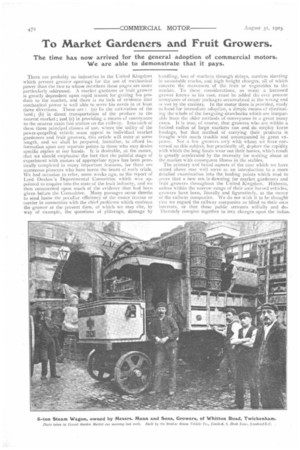
Page 9
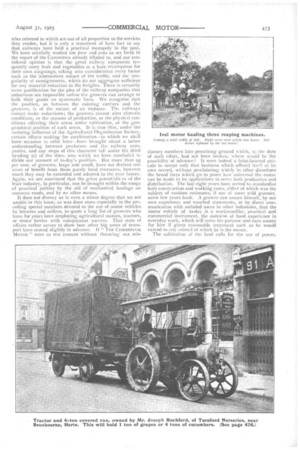
Page 10
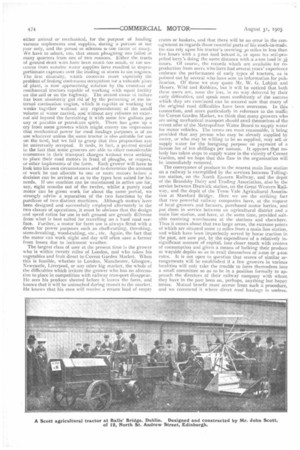
Page 11
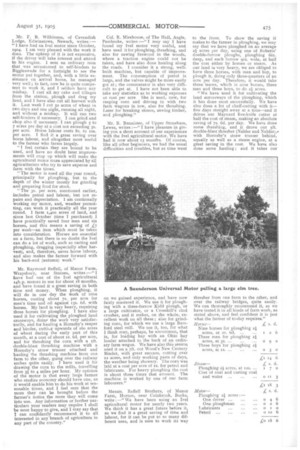
Page 12
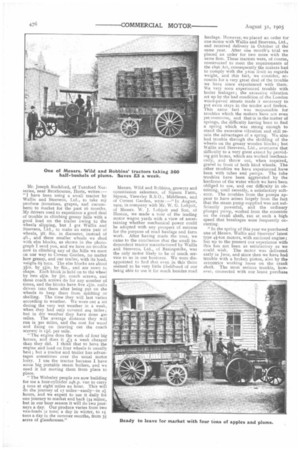
Page 13
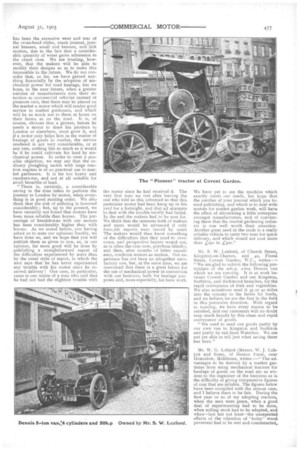
Page 14
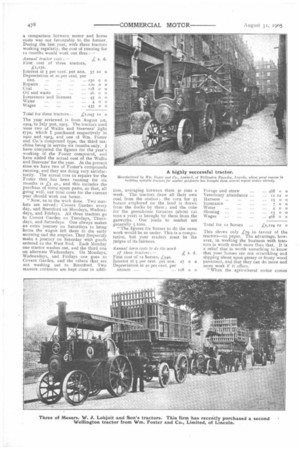
Page 15
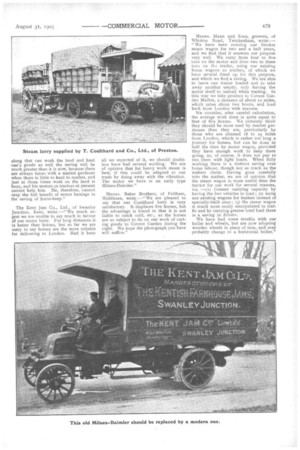
Page 16
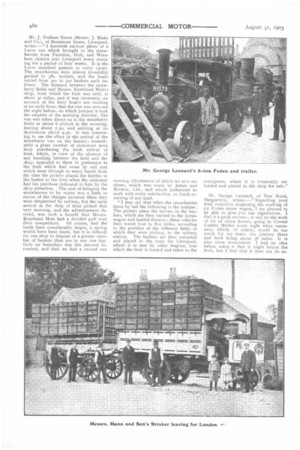
Page 17
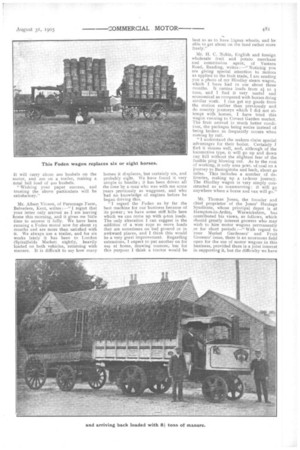
Page 18
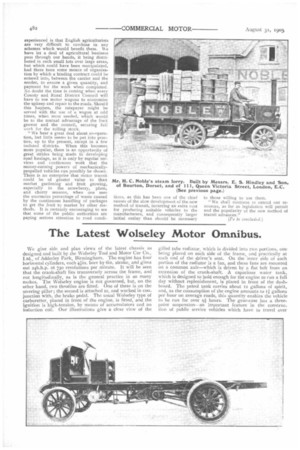
If you've noticed an error in this article please click here to report it so we can fix it.
The time has now arrived for the general adoption of commercial motors. We are able to demonstrate that it pays.
There are probably no industries in the United Kingdom which present greater openings for the use of mechanical power than the two to whose members these pages are more particularly addressed. A market gardener or fruit grower is greatly dependent upon rapid transit for getting his produce to the market, and there is no lack of evidence that mechanical power is well able to serve his needs in at least three directions. These are :-(a) In the cultivation of the land; (b) in direct transportation of the produce to the nearest market; and (c) in providing a means of conveyance to the nearest main line station on the railway. Into each of these three principal classes of use, where the utilily of the power-propelled vehicle must appeal to individual market gardeners and fruit growers, this article will enter at some length, and we shall be prepared, hereafter, to afford information upon any separate points to those who may desire specific replies at our hands. It is desirable, at the outset, ,that we should emphasisr the fact that the painful stage of experiment with motors of appropriate types has been practically completed in many important features, for there are numerous pioneers who have borne the brunt of early trials. We had occasion to refer, some weeks ago, LO the report of Lord Onslow's Departmental Committee which was appointed to enquire into the state of the fruit industry, and we then commented upon much of the evidence that had been given before the Committee. Many passages occur therein to send home the peculiar efficiency of the motor tractor or carrier in connection with the chief problems which confront the grower at the present time, of which we may cite, by way of example, the questions of pilferage, damage by h:indling, loss of markets through delays, careless sheeting in unsuitable trucks, and high freight charges, all of which concern the movement of the fruit or vegetables to the market. To these considerations, as many a harassed grower knows to his cost, must be added the ever present annoyance of empty packages accumulated at the wrong end or lost by the carriers. In the motor there is provided, ready to hand for immediate adoption, a simple means of eliminating the whole of the foregoing drawbacks which are inseparable from the older methods of conveyance in a great many cases. It is true, of course, that growers who are within a limited radius of large markets can and do employ horse haulage, but that method of carrying their products is fraught with much trouble and accompanied by great expense. Not a few growers only with whom we have conversed on this subject, but practically all, deplore the rapidity with which the long hauls wear out their horses, which result is greatly accelerated by the necessity for waiting about at the market with consequent illness in the stables.
The primary and broad aspects of the case which we have stated above may well serve as an introduction to a more detailed examination into the leading points which tend to irrove that a new era is dawning for market gardeners and fruit growers throughout the United Kingdom. Hitherto, unless within the narrow range of their own horsed vehicles, growers have been, literally and figuratively, at the mercy of the railway companies. We do not wish it to be thought that we regard the railway companies as blind to their own interests, or that these public servants wilfully and deliberately conspire together to levy charges upon the indus
tries referred to which are out of all proportion to the services they render, but it is only a statement of bare fact to say that railways have held a practical monopoly in the past. We have carefully studied tne pros and cons as set forth in the report of the Committee already alluded to, and our considered opinion is that the great railway companies frequently carry fruit and vegetables at a bare recompense for their own outgoings, taking into consideration every factor such as the intermittent nature of the traffic, and um irregularity of consignments, which du not aggregate sufficient for any material reduction in the freights. There is certainly some justification for the plea of the railway companies that reductions are impossible unless the growers can arrange to bulk their goods on systematic lines. We recognise that the position, as between the existing carriers and the growers, is of the nature of an impasse. The railways cannot make reductions; the growers cannot alter climatic conditions, or the seasons of production, or the physical conditions affecting their areas under cultivation, or the geographical position of such areas. It is true that, under the lostering influence of the Agricultural Organisation Society, certain efforts making for combination—to which we shall have occasion to refer later—have brought about a better understanding between producers and the railway companies, and any steps of this character fall under the third heading (c) of the direr into which we have concluded to divide our account of to-day's position. But more than 95 per cent, of growers, large and small, have not derived one atom of benefit from these purely local measures, however much they may be extended and adapted in the near future. Again, we are convinced that the great potentialites of the fruit industry, in particular, can be brought within the range of practical politics by the aid of mechanical haulage on common roads, and by no other means.
It does not dismay us in even a minor degree that we are unable in this issue, as was done more especially in the preceding special numbers devoted to the use of motor vehicles by brewers and millers, to quote a long list of growers who have for years been employing agricultural motors, tractors, or motor lorries with conspicuous success. That state of affairs rather serves to show how other big users of transport have moved slightly in advance. If " THE COMMERCIAL MOTOR " were to rest content without throwing out mis sionary numbers into promising ground which, to the date of such effort, had not been broken, where would be the possibility of advance? It were indeed a faint-hearted attitude to accept only that business which offered itself of its own accord, without proclaiming widely in other directions the broad facts which go to prove how universal the motor can be made in its applications to ser‘.e both production and distribution. The last eight years have served to standardise both construction and working costs, either of which was the subject of random estimates, if not of mere wild guesses, some few years back. A grower can assure himself, by our own experience and vouched statements, or by direct communication with satisfied users in other industries, that the motor vehicle of to-day is a workmanlike, practical and commercial instrument, the outcome of hard experience in everyday work, which will serve his purpose and earn money for him if given reasonable treatment such as he would extend to miy animal of which he is the owner.
The cultivation of the land calls for the use of power, either animal or mechanical, for the purpose of hatiliag various implements and supplies, during a portion of Lill: year only, and the period oi idleness is one faccor
We have to admit, Lou, that steam plougning has tailed in many quarters from one of two reasons. Either the tracts of ground dealt wan have been mucu too small, or tfie oisiances from suitable water supplies have resulted in disproportionate expenses over the leading of stores to the .engmes. The first diinculty, which concerns more especially the problem of finding continuous occupation for a valuable piece of plant, IS now approaching solution by the evolution of mechanical tractors capable of working with equal lacility on the soil or on the highway. The second cause oi tailure has been absolutely got rid of by the perlecting of the internal combustion engine, which is capable of working for weeks together without any replenishment of the small volume ol water carried, and without any reliance on external aid beyond the furnishing it with sonic few gallons per uay 01 paralfin or petroleum spirit. There has gone up a cry from some growers which might convey the impression that mechanical power tor road haulage purposes is of no use whatever unless the same tractor is also suitable for use on the land, but we fail to grasp that this proposition can be universally accepted. It nods, in fact, a pontted denial in the fact that some growers are able to effect considerable economies in their transport charges without even seeking to place their road motors in front of ploughs, or reapers, or other implements of the farm. Each grower will have to look into his own circumstances and to determine the amount ot work he can allocate to one or more motors before a decision can be arrived at as to the types best suited for his needs. If one machine can be maintained in active use for, say, eight months out of the twelve, whilst a purely road motor can be given work for about the same period, we strongly advise a separation of the two functions by the purchase of two distinct machines. Although motors have been designed and successfully employed alternately in the two classes of operations, it must be obvious that the design and speed ratios for use in soft ground are greatly different from what is best suited for travelling on a hard road surface. Further, a motor for farm use is always fitted with a drum for power purposes such as chaff-cutting, threshing, stone-breaking, wood-cutting, etc., etc. Again, the fact that the motor can work night and day will often save a farmer from losses due to inclement weather.
The largest class of user at the present time is the grower who is within twenty miles of London, and who Lakes his vegetables and fruit direct to Covent Garden Market. When this is feasible, whether to London, Manchester, Glasgow, Newcastle, Liverpool, or any other big market, the whole of the difficulties which irritate the grower who has no alternative to place in competition with railway transport disappear. He sees his produce sheeted before it leaves the farm, and knows that it will be untouched during transit to the market. He knows that his men will receive a return load of empty crates or baskets, and that there will be no error in the consignment as regards those essential parts of his stock-in-trade. Ile can rely upon his tractor's covering 3o miles in less than live hours with a 5-ton load behind it, or upon his self-propelled lorry's doing the same distance with a 2-ton load in 3i flours. Of course, the records which are available for reproduction from users who have had several years' experience embrace the performance of early types of tractors, as is pointed out by several who have sent us information for publication. Of these we may quote Mr. W. G. Lobjoit and Messrs. Wild and Robbins, but it will be noticed that both these users urn, none the less, in no way deterred by their early difficulties, and speak most confidently of the success which they are convinced can be secured now that many of the original road difficulties have been overcome. In this connection, and more particularly in reference to the traffic for Covent Garden Market, we think that many growers who are using mechanical transport should avail themselves of the recent offer of the Metropolitan Water Board to supply water for motor vehicles. The terms are most reasonable, it being provided that any person who may be already supplied by meter, or who may be willing to be so supplied, may sell or supply water for the foregoing purpose on payment of a license fee of ten shillings per annum. It appears that nobody has taken steps to supply water in the vicinity of Covent Garden, and we hope that this flaw in the organisation will be immediately removed.
The conveyance of produce Lo the nearest main line station on a railway is exemplified by the services between Tollington station, on the North Eastern Railway, and the depot of the Brandsby Dairy and Trading Association, also by the service between Helmick station, on the Great Western -Railway, and the depot of the Terne Vale Agricultural Association at Stanford Bridge. Here we see the striking fact that two powerful railway companies have, at the request of local growers and farmers, purchased motor lorries, and put them in service between an agricultural district and a main line station, and have, at the same time, provided suitable receiving warehouses at the stations and elsewhere. Thus it conies about that two large areas, the extreme points of which are situated some 12 miles from a main line station, and which have been imperfectly served by horse traction in the past, are now put, by the expenditure of a relatively insignificant amount of capital, into closer touch with centres of consumption and given a means of hulking their produce at wayside depots so as to avail themselves of 2-ton or 4-ton rates. It is not open to question that scores of similar arrangements will be established if a few growers in various localities will only take the trouble to form themselves into a small committee so as to be in a position formally to approach the directors of their railway company with whom they have in the past been on, perhaps, anything but happy terms. Mutual benefit must accrue from such a procedure, and we commend it where direct road haulage is useless.
Mr. F. B. Wilkinson, of Cavendish Lodge, Edwinstowe, Newark, writes :— "1 have had an Ivel motor since October, 1904. I am very pleased with the work it does. The upkeep alit is not expensive, if the driver will take interest and attend to his engine. 1 sent an ordinary man that was accustomed to self-binders to Biggleswade for a fortnight to see the motor put together, and, with a little assistance on arrival home, he managed very well ; in fact, now he is quite compe tent to work it, and I seldom have any mishap. I cart all my cake and tillages from the station, plough and drag my land, and I have also cut all harvest with it. Last week I cut so acres of wheat in
two days and one night, running all night, and without a mishap. It will run two self-binders if necessary. I can grind and chop also if necessary. I can plough 5 to 7 acres per day at a cost not exceeding 35. per acre. Horse labour costs 8s. to Jos. per acre. I find it a great saving over horse labour, and altogether most useful to the farmer who farms largely.
"I feel certain they are bound to be used, and have no doubt later improvements will crop up which will make the agricultural motor more appreciated by all agriculturists who try to save expense and farm with the times.
"The motor is used all the year round, principally for ploughing, but in the depth of the winter mostly for grinding and preparing food for stock.
"The 3s. per acre, mentioned earlier, includes petrol and labour, but not repairs and depreciation. 1 am continually working my motor, and, weather permitting, can work it practically all the year round. I farm 1,400 acres of land, and since last October (time I purchased) 1 have practically saved four men and six horses, and this means a saving of 47 per week—an item which must be taken into consideration. Horses are essential on a farm, but there is no doubt the Ivel can do a lot of work, such as carting and ploughing, dragging (especially after harvest), and, therefore, saves horse labour, and also makes the farmer forward with his back-end (autumn) work."
Mr. Raymond Reffell, of Manor Farm, Wraysbury, near Staines, writes :—" I have had one of the Ivel agricultural 14h.p. motors in use for about 18 months, and have found it a great saving in both time and money. When ploughing, it will do in one day the work of nine horses, costing about 7s.. per acre for men's time and oil against i3s. 6d. with horses. My land is very heavy, requiring three horses for ploughing. I have also used it for cultivating the ploughed land crossways, doinv the work very satisfactorily, and for hauling a Homsby's reaper and binder, cuttii,g upwards of 16o acres of wheat during the early part of this month, at a cost of about is. 6d. per acre, and for threshing the corn with a sft. double-blast thrashing machine with a Hornsby's straw trusser attached and hauling the thrashing machine from one farm to the other, going over the railway arches quite easily. I have used it for drawing the cern to the mills, travelling from 3i to 4 miles per hour. My opinion of the motor is that every large farmer who studies economy should have one, as it would enable him to do his work at seasonable times, and I feel sure that the more they can be brought before the farmer's notice the more they will come into use. Any information or further particulars your readers may require I shall be most happy to give, and I may say that I can confidently recommend it to all interested in any branch of agriculture in any part of the country."
Col. R. Mirehouse, of The Hall, Angle, Pembroke, writes —"I may say I have found my Ivel motor very useful, and have used it for ploughing, thrashing, and also for sawing firewood in the woods, where a traction engine could not be taken, and have also done hauling along the roads. I consider it a strong, wellbuilt machine, but capable of improvement. The consumption of petrol is large, and the valves might be more easily got at ; the commutator is also very diffi. cult to get at. I have not been able to take any statistics as to working expenses or cost per acre She is used, now, for reaping corn and driving in with two farm wagons in tow, also for thrashing. Later for breaking stones, sawing timber, and ploughing."
Mr. R. Bannister, of Upper Stoneham, Lewes, writes:—"I have pleasure in giving you a short account of our experiences with the Ivel agricultural motor. We have had it now about z5 months. Of course, like all other beginners, we had the usual difficulties and troubles, but as time went
on we gained experience, and have now fairly mastered it. We use it for ploughing with a three-furrow Kidd plough, or a large cultivator, or a Crosskill's clod crusher, and it makes, on the whole, excellent work on all these ; also for grinding corn, for which we use a large Bamford steel mill. We use it, too, for what I think may, perhaps, be uncommon, that is, for loading hay with an Ohio hay loader attached to the back of an ordinary farm wagon. We have also this season used it on a 7ft. cut Wood's New Century Binder, with great success, cutting over 12 acres, and only working parts of days, the weather being showery. The corn was laid at a cost per acre of is. for petrol and lubricants. For heavy ploughing the cost is about three times that amount. The machine is worked by one of our farm labourers."
Messrs. ReffelI Brothers, of Manor Farm, Horton, near Colnbrook, Bucks, write :—" We have been using an Ivel agricultural motor for nearly two years. We think it has a great future before it, as we End it a great saving of time and labour, for it can be put to so many different uses, and is sure to work its way to the front. To show the saving it makes to the farmer in ploughing, we may say that we have ploughed on an average 21 acres per day, using one of Roberts' double-furrow ploughs, ploughing 6in. deep, and each furrow gin. wide, at half the cost either by horses or steam. As our land is very heavy, we are obliged to have three horses, with man and boy, to plough it, doing only three-quarters of an acre per day. Therefore, it would take three teams, which is nine horses, three men and three boys, to do 21 acres.
"We have used it for cultivating the land acrossways of the ploughing, which it has done most successfully. We have also done a lot of chaff-cutting with it— five days straight away at a time—and it drives our Maynard five-knife cutter at half the cost of steam, making an absolute saving of 7s. 6d. per day. We have done some threshing, and it drove our sft. double-blast thresher (Nalder and Nalderie with Hornsby's straw trusser behind, equally as well as a steam engine, at a great saving in the cost. We have also done some hauling; and it takes our thresher from one farm to the other, and over the railway bridges, quite easily. We can thoroughly recommend it, as we have tested it in all kinds of farm work, as stated above, and feel confident it is just what the farmer of to-day requires."
Horses— s. d. Nine horses for ploughing 21 acres, at 2s. 6d. 2 6 Three men for ploughing 2i
acres, at 3s. o g o Three boys for ploughing 21 acres, at is . o 3 o
Mr. Joseph Rochford, of Turnford Nurseries, near Broxbourne, Herts, writes :— "I have been using a small tractor by Wallis and Steevens, Ltd., to take my produce (tomatoes, grapes, and cucumbers) to market for the past 16 months. My drivers used to experience a good deal of trouble in climbing greasy hills with a good load on the trailer owing to the wheels slipping, but I got Wallis and Steevens, Ltd., to make an extra pair of wheels, 3ft. 8in. in diameter, instead of 4ft., and those smaller wheels we shod with elm blocks, as shown in the photegraph I send you, and we have no trouble now in climbing any of the hills we meet on our way to Covent Garden, no matter how greasy, and our trailer, with its load, weighs 6 tons. The elm blocks are about On. by 3iin. by Sin., and are sawn to shape. Each block is held on to the wheel by two 21in. by din. coach screws, and these coach screws do for any number of times, and the blocks have five sin. nails driven into them after being put on the wheels to keep them from splitting or shelling. The time they will last varies according to weather. We wore out a set during the very wet weather in a week, when they had only covered 204 miles ; but in dry weather they have done 400 miles. The average distance they will run is 300 miles, and the cost for wood and fixing on (leaving out the coach screws) is rid, per mile.
"The engine does the work of four big horses, and does it £3 a week cheaper than they did. I think that to have the engine arid load on four wheels is usually best ; but a tractor and trailer has advantages sometimes over the usual motor lorry. I use the tractor because I have some big, portable steam boilers, and we need it for moving them from place to place.
"The Wolseley people are now building for me a four-cylinder 2411.p. van to carry 3 tons at eight miles an hour. This will do the journey of 17 miles—easily—in 21 hours, and we expect to use it daily for one journey to market and back (34 miles), but in our busy season it will do two journeys a day. Our produce varies from two van-loads (2 tons) a day in winter, to 15 tons a day in the summer months, from 35 acres of glasshouses."
Messrs. Wild and Robbins, growers and commission salesman, of Sipson Farm, Sipson, Yiewsley R.S.O., Middlesex, and of Covent Garden, write :—" In August, 1902, in company with Mr. W. G. Lobjoit, of Messrs. W. J. T.objoit and Son, of Heston, we made a tour of the leading motor wagon yards with a view of ascertaining whether mechanical power could be adopted with any prospect of success for the purpose of road haulage and farm work. After having made the tour, we came to the conclusion that the small independent tractor manufactured by Wallis and Steevens, Ltd., of Basingstoke, was the only motor likely to be of much service to us in our business. We were disappointed to find that even in this there seemed to be very little likelihood of our being able to use it for much besides road haulage. However, we placed an order for one motor with Wallis and Steevens, Ltd., and received delivery in October of the same year. After one month's trial we placed an order for two more with the same firm. These tractors were, of course, constructed to meet the requirements of the 1896 Act, consequently the makers had to comply with the 3-ton limit as regards weight, and this fact, we consider, accounts for a very great deal of the trouble we have since experienced with them. We very soon experienced trouble with boiler leakages ; the excessive vibration set up by the bad condition of the London woed-paved streets made it necessary to. put extra stays in the tender and firebox. This same fact was responsible for troubles which the makers have not even yet overcome, and that is in the matter of springs, the difficulty having been to find a spring which was strong enough to stand the excessive vibration and still retain the advantages of a spring. We alsohad trouble through the skidding of the wheels on the greasy wooden blocks; but Wallis and Steevens, Ltd., overcame that difficulty to a very great extent by providing grit boxes, which are worked mechanically, and throw out, when required, gravel in front of both hind wheels. The other troubles we have experienced have been with tubes and pumps. The tube troubles have been aggravated by thehardness of the water which we have been obliged to use, and our difficulty in obtaiMng, until recently, a satisfactory softener. The troubles from the pumps appear to have arisen largely from the fact that the steam pump supplied was not sufficiently powerful, and the ordinary plunger pump, worked from the eccentric on the crank shaft, ran at such a high. speed that breakages were frequently occurring.
"In the spring of this year we purchased one of Messrs. Wallis and Steevens' latest type 4i-ton motors, with enclosed engine; but up to the present our experience with this has not been as satisfactory as we could wish. The motor was delivered early in June, and since then we have had trouble with a broken piston, also by the eccentrics working loose on the crank shaft. The most serious trouble, however, connected with our latest purchase has been the excessive wear and tear of the cross-head slides, crank journal, journal brasses, small end brasses, and link motion, due to the fact that a considerable quantity of water gains admission to the crank case. We are trusting, however, that the makers will be able to modify their designs so as to make this impossible in the future. We do not consider that, so far, we have gained anything financially by the adoption of mechanical power for road haulage, but we hope, in the near future, when a greater number of manufacturers turn their attention to commercial vehicles instead of pleasure cars, that there may be placed on the market a motor which will render good service to market gardeners, and which will be as much use to them at home on their farms as on the road. it is, of course, obvious that a grower, before he needs a motor to draw his produce to London or elsewhere, must grow it, and if a motor only helps him in the matter of haulage of goods to market, the service rendered is not very considerable, or at any rate, nothing like so much as it would be if he could cultivate his land by mechanical power. In order to meet a possible objection, we may say that the ordinary ploughing tackle with large traction engines is of no practical use to market gardeners. It is far too heavy and cumbersome, and not at all suitable for small breadths of land.
"There is, certainly, a considerable saving in the time taken to perform the journey to London by motor, when everything is in good running order. We also think that the risk of pilfering is lessened considerably ; but, up to the present, we have certainly not found that motors have been more reliable than horses. The percentage of breakdowns with our motors has been considerably higher than with horses. As we stated before, you having asked us to state our opinions frankly, we have done so, and we hope that you will publish them as given to you, as, in our opinion, far more good will be done by publishing a straightforward report of the difficulties experienced by users than by the usual style of report, in which the user says that he has never experienced any trouble with his motor since he received delivery l One case, in particular, came to our notice of a man who said that he had not had the slightest trouble with
the motor since he had received it. The very first man we met after leaving the one who told us this informed us that this particular motor had been hung up in his yard for a fortnight, and that all attempts to deal with the trouble locally had failed. In the end the makers had to be sent for. We think that the interests both of makers and users would be advanced if only bona-fide reports were issued by users The makers would then know something of the difficulties that they need to overcome, and prospective buyers would not, as is often the case now, purchase blindly, and then, after months of bitter experi. ence, condemn motors as useless. Our experience has not been an altogether satisfactory one, but, at the same time, we are convinced that there is a great future for the use of mechanical power in connection with our business, both for haulage purposes and, more especially, for farm work. We have yet to see the machine which exactly meets our needs, but hope that the number of your journal which you intend publishing, and which is to deal with motors for market garden work, will have the effect of stimulating a little enterprise amongst manufacturers, and of convincr lug them that the market gardening industry is one well worth their attention. Another great need in the trade is a really reliable vehicle to carry two tons for quick delivery, and which would not cost more than Lao to £300."
'Mr. S. W. Luxford, of Church Street, Kingston-on-Thames, and 40, Floral Street, Covent Garden, W.C., writes :— " We are glad to submit the following partictilars of the 2oh.p. a-ton Dennis van which we are running. It is at work between Covent Garden and our Kingston, Surbiton, and Richmond branches, for the rapid conveyance of fruit and vegetables. We also sometimes send it 35 or 40 miles into the country to the farms for loads, and we believe we are the first in the field int this particular direction. With regard to running, we have every reason to be satisfied, and our customers will no doubt reap much benefit by this clean and rapid conveyance of goods.
"We used to send our goods partly by our own van to Kingston and Surbiton and partly by rail from Waterloo. We are not yet able to tell just what saving there has been" Mr. W. G. Lobjoit (Messrs. W. J. Lobjolt and Sons), of Heston Farm, near Hounslow, Middlesex, writes :—" The advantages to be derived by a market gardener from using mechanical tractors for haulage of goods on the road are as evident to the organiser of the business as is the difficulty of giving comparative figures of cost that are reliable. The figures below have been compiled with the utmost care, and I believe them to be fair. During the first year or so of my adopting tractors, when the men were green, when a good. deal of experimenting had to be done, when rolling stock had to be adapted, and when—last but not least—the unexpected. effects of the vibration of ' holey ' wood. pavement had to be met and counteracted, a comparison between motor and horse costs was not favourable to the former. During the last year, with three tractors working regularly, the cost of running for 12 months would work out thus :— Annual tractor costs:— 4 s. d.
First cost of three tractors,
The year reviewed is from August ist, 1904, to July 3rst, xeci5. The tractors used were two of Wallis and Steevens' light type, which I purchased respectively in 1902 and 1903, and one of Wm_ Foster and Co.'s compound type, the third machine being in service six months only. I have computed the figures for the year's working of the Foster compound, and have added the actual cost of the Wallis and Steevens' for the year. At the present time we have two of Foster's compounds running, and they are doing very satisfactorily. The actual cost in repairs for the Foster that has been running for six months is 45 41., and this includes the purchase of some spare parts, so that, all going well, our total costs for the current year should work out better.
"Now, as to the work done. Two markets are served; Covent Garden every day, and Brentford on Mondays, Wednesdays, and Fridays. All three tractors go to Covent Garden on Tuesdays, Thursdays, and Saturdays. One always makes an extra journey on Saturdays to bring home the wagon left there in the early morning and the empties. They frequently make a journey on Saturday with goods ordered to the West End. Each Monday one tractor washes out, and the third one on alternate Wednesdays. On Mondays, Wednesdays, and Fridays one goes to Covent Garden, and the others that are not washing out to Brentford. Two manure contracts are kept clear in addi tion, averaging between them 30 tons a week. The tractors draw all their own coal from the station ; the corn for 35 horses employed on the land is drawn from the docks by them ; and the coke for the greenhouse furnaces (about 120 tons a year) is brought by them from the gasworks. Our loads to market are generally 5 tons.
"The figures for horses to do the same work would be as under. This is a computation, but your readers must be the judges of its fairness.
Annual horse costs to do the work
of three tractors:— s. d. First cost of 12 horses, £540. Interest at 5 per cent, per ann. 27 o o Depreciation at 20 per cent. per
annum ... 1(38 o o This shows only £79 in favour of the tractors—on paper. The advantage, however, in working the business with tractors is worth much more than that. It is a relief that is worth something to know that your horses are not scrambling and slipping about upon greasy or frosty wood pavement, and that they can do more and more work if it offers.
"When the agricultural motor comes
along that can work the land and haul one's goods as well the saving will be much greater than it is now, because there are always times with a market gardener when there is little to haul to market, and just at those times work on the land is busy, and his motors or tractors at present cannot help him He, therefore, cannot reap the full benefit of motor haulage in the saving of horse-keep."
The Kent Jam Co., Ltd., of Swanky Junction, Kent, write :—" We much regret we are unable to say much in favour of our motor lorry. For long distances it is better than horses, but so far we are sorry to say horses are the more reliable for delivering to London. Had it been ali we expected of it, we should doubtless have had several working. We are of opinion that for heavy work steam is best, if this could be adapted to our trade by doing away with the vibration. The motor we have is an early type Milnes-Dainiler."
Messrs. Baker Brothers, of Feltham, Middlesex, write :—" We are pleased to say that our Coultliard lorry is very satisfactory. It displaces five horses, but the advantage is found in that it is not liable to catch cold, etc., as the horses are so subject to do on our work of carting goods to Covent Carden during the night. We hope the photograph you have will suffice."
Messrs. Mann and Sons, growers, of 'Whitton Road, Twickenham, write :— " We have been running our Straker steam wagon for two and a half years, and we find that it answers our purpose very well. We carry from four to five tons on the motor and from two to three ton, on the trailer, using our existing horse wagons as trailers, of which we have several fitted up for this purpose, and which we find a saving. We are able to leave one trailer loaded and to take away another empty, only having the motor itself to unload while waiting. In this way we take produce to Covent Garden Market, a distance of about 12 miles, which takes about two hours; and load back from London with manure.
We consider, after careful calculation, the average work done is quite equal to that of five horses. We certainly think they should be more used by market gardeners than they are, particularly by those who are situated 18 to 25 miles from T.ondon, which is rather too long a journey for horses, but can be dune in half the time by motor wagon, provided they have enough work to keep them going, as, of course, it does not pay to run them with light loads. When fully working there is a distinct saving over horse labour, though not as much as the makers claim. Having gone carefully into the matter, we are of opinion that the steam wagon is more useful than the tractor for our work for several reasons, viz. • —i Greater carrying capacity by having the Iwo vehicles to load ; (21 ustng our existing wagons for trailers instead of specially-built ones ; (3) the steam wagon is much more easily manipulated in traffic and by carrying greater total load there is a saving in drivers.
We have had some trouble with our boiler and wheels, but are now adopting wooden wheels in place of iron, and may probably change to a horizontal boiler."
Mr. J. Graham Reece ;Messrs. J. Blake and Co.), of Beaumont Street, Liverpool, writes 7-‘ I herewith enclose photo of a Lacre van which brought in the strawberries from Farndon, Holt, and Wrexham district into Liverpool every morning for a period of four weeks. It is the Lacre standard pattern to carry iscwt. The strawberries were almost invariably packed in 31b. baskets, and the loads varied from 300 to soo baskets each delivery. The distance between the strawberry fields and Messrs. Keartland Mole's shop, from which the fruit was sold, is about 30 miles, and it was necessary, on account of the ferry boat's not running at an early hour, that the van was sent out the night before, on which journey it took the empties of the morning delivery. The van was taken direct on to the strawberry fields at about 6 o'clock in the morning, leaving about 7.3o, and arriving at its destination about 9.30. It was interesting to see the effect of the arrival of the strawberry van on the buyers; immediately a great number of customers were busy purchasing the fresh arrival of fruit, which, in view of the absence of any handling between the field and the shop, appealed to them in preference to the fruit which had come by rail and which went through so many hands from the time the pickers placed the berries in the basket to the time when the customer had his purchase delivered to him by the shop attendant. The cost of bringing the strawberries in by motor was a little in excess of the charges incurred when they were despatched by railway, but the early arrival at the shop of fruit picked that very morning, and the advertisement derived, was such a benefit that Messrs. Keartland Mole had a decided pull over
their competitors. Of course, had the loads been considerably larger, a saving would have been made, but it is difficult for one shop to dispose of a greater number of baskets than 500 in any one day. Only on Saturdays was this amount increased, and then we had a second van running fillustration of which we also enclose), which was made by James and Browne, Ltd., and which performed its work with every satisfaction, no hitch occurring of any kind.
"I may say that when the strawberries leave by rail the following is the routine : The pickers place the berries in the baskets, which are then carried to the horse. wagon and loaded thereon ; these vehicles then travel four to five miles, according to the position of the different fields in which they were picking, to the railway station. The baskets are then unloaded and placed in the train for Liverpool, where it is met by other wagons, into which the fruit is loaded and taken to the consignees, where it is eventually unloaded and placed in the shop for sale."
Mr. George Leonard, of New Road, Shepperton, writes :—" Regarding your kind enquiries respecting the working of my Foden steam wagon, I am pleased to be able to give you our experiences. I find it a great success ; it will do the work of six or seven horses, going to Covent Garden Market every night when necessary, which, of course, would be too much (Cr my team, the journey there and back being about 38 miles. It is also more economical. I had an idea before using it that it might bruise the fruit, but I find that it does not do so. It will carry about zoo bushels on the motor, and 200 on a trailer, making a total full load of goo bushels.
"Wishing your paper success, and trusting the above particulars will be satisfactory."
Mr. Albert Vinson, of Parsonage Farm, Belvedere, Kent, writes :—" I regret that your letter only arrived as I am leaving home this morning, and it gives me little time to answer it fully. We have been running a Foden motor now for about 15 months and are more than satisfied with it. We always use a trailer, and for six weeks lately it has been to London 4Spitalfields Market) nightly, heavily loaded on both vehicles, returning with manure. It is difficult to say how many
horses it displaces, but certainly six, and probably eight. We have found it very simple to handle; it has been driven all the time by a man who was with me some years previously as waggoner, and who had no knowledge of engines before he began driving this.
"I regard the Foden as by far the best machine for our business because of its power ; we have some stiff hills here which we can come up with 9-ton loads. The only alteration I can suggest is the addition of a wire rope to move loads that are sometimes on bad ground or in awkward places, and I think this would be a very great improvement. Regarding extensions, I expect to put another on for use at home, drawing manure, but for this purpose I think a tractor would be best so as to have tigner. wheels, and be able to get about on the land rather more freely."
Mr. H. C. Noble, English and foreign wholesale fruit and potato merchant and commission agent, of Vastern Road, Reading, writes :—" Noticing you are giving special attention to motors as applied to the fruit trade, I am sending you a photo of my Hindley steam wagon, which I have had in use about three months. it carries loads from 21 to 3 tons, and I find it very useful and economical as compared with horses doing similar work. I can get my goods from the station earlier than previously and do country journeys which I did not attempt with horses. I have tried this wagon running to Covent Garden market. The fruit arrived in much better condi. tion, the packages being entire instead of being broken as frequently occurs when coming by rail.
"I understand the makers claim special advantages for their boiler. Certainly I find it steams well, and, although of the locomotive type, it will go up and down any hill without the slightest fear of the fusible plug blowing out. As to the cost of working, it only uses 3cwt. of coal on a journey to Basingstoke and back, about 40 miles. This includes a number of de. liveries, making up a i2-hour journey. The Hindley wagon is very simply constructed as to manceuvring : it will go anywhere where a horse and van will go."
Mr. Thomas Jones, the founder and chief proprietor of the Jones' Haulage Syndicate, whose principal depot is at Ilampton-in-Arden, Warwickshire, has contributed his views, as follows, which should greatly interest growers who may wish to hire motor wagons permanently or for short periods :—" With regard to your Market Gardeners' and Fruit Growers' issue, there is art enormous field open for the use of motor wagons in this business, provided there is a joint interest in supporting it, but the difficulty we have experienced is that English agriculturists are very difficult to combine in any schemes which would benefit them. We have let a deal of agricultural business pass through our hands, it being distributed in such small lots over large areas, but which could have been manipulated, had there been some means of organisation by which a binding contract could he entered into, between the carrier and the sender, to ensure a given quantity, and payment for the work when completed. No doubt the time is coming when every County and Rural District Council will have to use motor wagons to economise the upkeep and repair to the roads. Should this happen, the ratepayer might be served with the use of a wagon at odd times, when most needed, which would be to the mutual advantage of the fruit grower and the council, securing full work for the rolling stock.
"We hear a great deal about co-operation, but little seems to be put into practice, up to the present, except in a few isolated districts. When this becornes more popular, there is an opportunity of great strides being made in developing road haulage, as it is only by regular services and continuous work that the money-earning powers of mechanicallypropelled vehicles can possibly be shown. There is no enterprise that motor transit could be of greater value to than market gardening and fruit growing, especially in the strawberry, plum, and cherry seasons, when one sees the enormous percentage of waste caused by the continuous handling of packages to get the fruit to market by other methods. It is certainly encouraging to see that some of the public authorities are paying serious attention to road conch tions, as this has been one of the chief causes of the slow development of the new method of transit, incurring an extra cost for producing suitable vehicles to the manufacturers, and consequently larger initial outlay than should be necessary
to those willing to use them.
"We shall continue so extend our resources, as far as legislation will permit and the popularity of the stew method of transit advances."
























